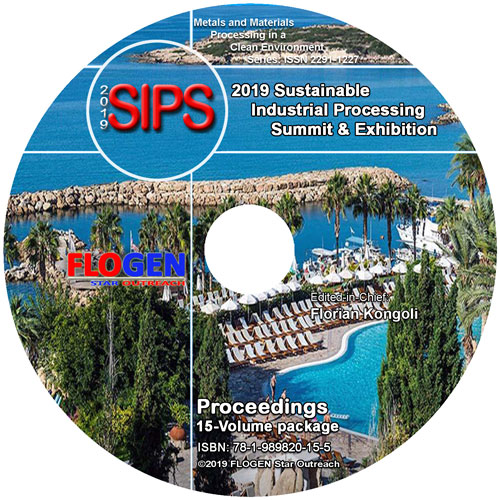2019-Sustainable Industrial Processing Summit
SIPS2019 Volume 12: Energy Production and Secondary Batterie
| Editors: | F. Kongoli, H. Dodds, M. Mauntz, T. Turna, K. Aifantis, A. Fox, V. Kumar |
| Publisher: | Flogen Star OUTREACH |
| Publication Year: | 2019 |
| Pages: | 112 pages |
| ISBN: | 978-1-989820-11-7 |
| ISSN: | 2291-1227 (Metals and Materials Processing in a Clean Environment Series) |

CD shopping page
A World Without Waste
Athan Fox1;1AURELIUS ENVIRONMENTAL, Dudley, United Kingdom;
Type of Paper: General Plenary
Id Paper: 500
Topic: 46
Abstract:
Confucius wrote that “The beginning of wisdom is to call things by their proper name.†But as the world strives towards a cleaner and greener economy, confusion is as rife as ever.
Climate and environmental sciences are riddled with jargon and contradictory studies. The concept of a ‘circular economy’ and the modelling of ‘carbon footprints’ have failed to inspire the general population. Today, the divide between policy makers, activists and members of the public is a gaping chasm.
But as the search for a sustainable way of life tumbles on, we ask: where will the waste go?
In the fast-moving world of technology and innovation, it takes all the running you can do to stay in the same place. Take Moore’s Law as an example – the number of transistors in a dense integrated circuit doubles about every two years. In other words: today’s technology and gadgets are tomorrow’s outdated scrap.
But at what cost? As we move from one technology to another, in a world landscaped by ever-changing political moods, a great deal can be lost in translation. Take for example the transition to electric vehicles – which currently rely on Lithium-Ion batteries for the storage and delivery of electricity. Is the transition from fossil fuel to electricity as clean as we think it is?
Current automotive technology is using lead-acid batteries – a product which is synonymous with pollution because it works hand-in-hand with petrol and diesel engines. As for the recycling of lead batteries (i.e. smelting), this activity is considered by some as being the world’s most polluting industry.1
But isn’t the lead-acid battery also known as the world’s most recycled commodity product?2
In the US, almost 100% of these batteries are collected and recycled. The same cannot be said for Lithium-Ion batteries – which are currently nowhere near as recycled as lead-acid batteries. Moreover, electric vehicles are only as clean as the electricity they run on. Indeed, if we burn coal to produce electricity then all we have done is to shift the carbon footprint from the vehicle to the point of production of electricity.
The lead-acid battery was invented in 1859 – that is, before the mechanical generation of electricity. As a product, it has been around for more than 150 years. Its market share is expected to reach $95 billion USD by 2026.3 Lead batteries can support tomorrow’s Cleantech industry and our transition to a zero-waste future. But for this to happen, the incumbent lead recycling industry must become cleaner, more energy-efficient and less wasteful.
In this presentation, we explore the concept of producing materials from waste (as opposed to energy from waste) using as an example a low-temperature process for the recycling of lead-acid battery waste. The philosophy of looking at waste as resources with exploitable value is considered. An industrial concept for the utilisation of battery waste, municipal waste, mineral acid and base waste, plastics and carbon capture is debated in the context of our current and future economy.
Keywords:
Battery; Energy; Environmental; Recycling;References:
1) S. R. Dovers and J. W. Handmer, Environmental Conservation, Volume 20, Issue 3, 1993, pages 217 - 222.2) A. D. Ballantyne, J. P. Hallett, D. J. Riley, N. Shah and D. J. Payne, Lead acid battery recycling for the twenty-first century, R. Soc. open sci.5: 171368, 2018.
3) Battery Systems for Electric Energy Storage Issues, Battery Industry RTD Position Paper, EUROBAT, July 2015.